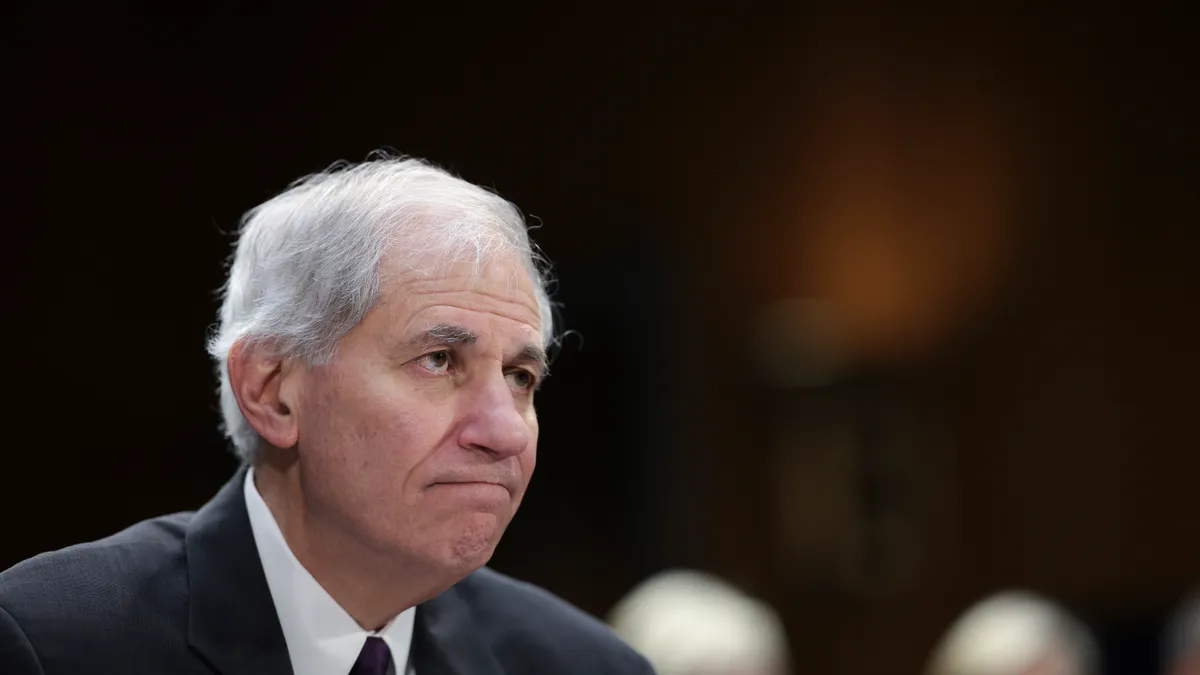The nation’s largest banks will pay more to the Deposit Insurance Fund than initially anticipated — roughly $16.3 billion, up from a May estimate of $15.8 billion — to cover losses from uninsured deposits at Signature and Silicon Valley Bank at the time of their failure, according to a final rule approved Thursday by the Federal Deposit Insurance Corp.
The agency canceled — 15 minutes after it was set to begin — the public meeting at which it meant to address the deposit insurance rule. But board members submitted written votes in private. A spokesperson for the FDIC did not comment to Bloomberg or Reuters on the reason for the last-minute change of schedule.
But the FDIC this week became engulfed in allegations that its chairman, Martin Gruenberg, for years, turned a blind eye to sexual misconduct by agency staff. Monday’s Wall Street Journal report cited interviews with more than 100 current and former FDIC employees — including roughly 20 women who quit the agency — with some describing a “toxic atmosphere” and a “sexualized, boys’ club environment.”
The allegations surfaced a day ahead of Gruenberg’s testimony before the Senate Banking Committee, to whom he said he was not “generally aware” of the allegations” but was nonetheless “personally disturbed and deeply troubled.”
Outcry against Gruenberg intensified Wednesday, when, in front of the House Financial Services Committee, the panel’s chairman, Patrick McHenry, R-NC, asked Gruenberg if he had ever been investigated for misconduct. Gruenberg said he had not but later acknowledged he was investigated in 2008 but that the complaint was dropped.
Calls for ouster
The chorus of lawmakers calling for Gruenberg’s ouster grew louder Thursday.
“Desperately needed changes at the FDIC are not possible if the agency is still being led by an individual who himself was investigated for alleged mistreatment,” Sen. Thom Tillis, R-NC, said Thursday on X, formerly Twitter. “Marty Gruenberg should resign.”
Sen. Joni Ernst, R-IA, echoed the call for resignation. “Not only did he fail his employees, he lied to Congress,” she wrote on X, of Gruenberg. “Accountability is coming.”
In a letter calling for Gruenberg’s resignation, Sen. John Kennedy, R-LA, cited Wall Street Journal reporting that detailed a letter of reprimand Harrel Pettway, an FDIC legal official, received after leaving a ranting voicemail aimed at another employee. The FDIC paid out a $100,000 settlement over the incident, Kennedy recounted, but Pettway was eventually promoted to general counsel.
“Given the vital role the FDIC plays in upholding America’s financial and economic systems, it is imperative that its leader be one with irreproachable demeanor and character,” Kennedy wrote. “These troubling allegations call into question your ability to continue leading and present a troubling picture of your tenure.”
Not all Republicans were as harsh. Sen. Tim Scott, R-SC, stopped short of calling for Gruenberg’s dismissal, saying the FDIC chair “should seriously consider if he possesses the leadership the [agency] requires at this moment to restore confidence.”
Democrats generally held off calling for leadership change at the FDIC. Sen. Sherrod Brown, D-OH, called the WSJ reports “extremely concerning,” and added the FDIC’s Office of the Inspector General should conduct an “independent and thorough investigation into the workplace culture at the agency.”
The White House went a step further, according to American Banker, urging the Senate to "swiftly confirm our FDIC Inspector General nominee, who is charged with critical oversight responsibilities.”
The two Republican members of the FDIC board, Jonathan McKernan and Vice Chair Travis Hill, also called for an independent review of workplace culture, with the caveat that Gruenberg and Pettway recuse themselves.
“The board should have more information about the investigation than it does right now,” McKernan told the Financial Times.
Potential consequences
As for the deposit insurance final rule, the FDIC kept its May proposal largely intact, ignoring industry calls for a change in the methodology for calculating payments.
About 114 banks will pay an annual rate of about 13.4 basis points — higher than the 12.5 basis points initially proposed — over eight quarters beginning in June 2024. Lenders with less than $5 billion will not have to pay, according to Thursday’s final rule.
American Bankers Association CEO Rob Nichols said his trade group was pleased that smaller banks were left out of DIF collection but added “we are disappointed, however, that the final cost of the assessment has increased.”
A leadership change at the FDIC would likely throw a wrench into other upcoming rulemaking, such as a July proposal that the FDIC, Federal Reserve and Office of the Comptroller of the Currency issued in tandem, calling for an increase in capital requirements for the nation’s largest banks.
"If Marty steps down, I think we can expect very little progress on some key initiatives, at least in the near term,” Michele Alt, a partner at consulting firm Klaros Group and former longtime OCC employee, told The Wall Street Journal.
Hill, as vice chair, would likely become acting chair if Gruenberg were to leave, setting up the FDIC’s board to be split evenly 2-2 between Republicans and Democrats.
This week’s allegations is the latest scandal to spotlight the political divisions within the FDIC board. The agency, under Republican Chair Jelena McWilliams, blasted Gruenberg and fellow board member Rohit Chopra in 2021 for publishing a review of bank merger policies without McWilliams’ approval. The then-Republican chair of the Senate Banking Committee compared the incident to a “failed coup,” but the power struggle ended with McWilliams’ resignation, spurring President Joe Biden to nominate Gruenberg to lead the FDIC for a second time. (His first term ran from 2011 to 2018.)
McHenry, the Republican House Financial Services Committee chair, urged his panel Thursday to “conduct a rigorous investigation including hearings, oversight and transcribed interviews.
“It’s clear Mr. Gruenberg never should have been reappointed or confirmed in the first place,” McHenry said in a statement. “Chairman Gruenberg has a lot of explaining to do.”





















